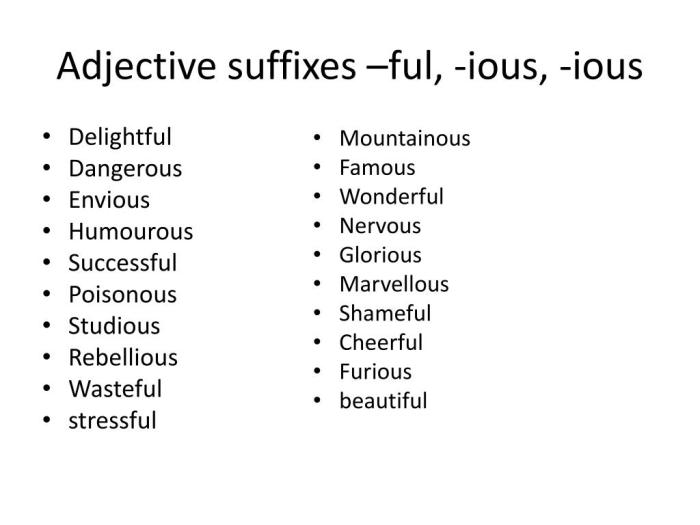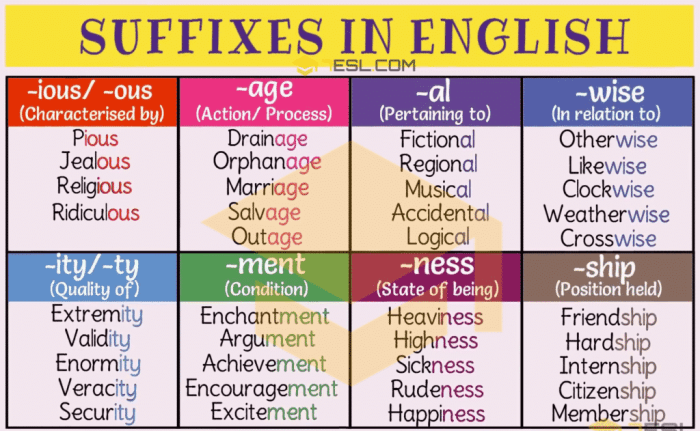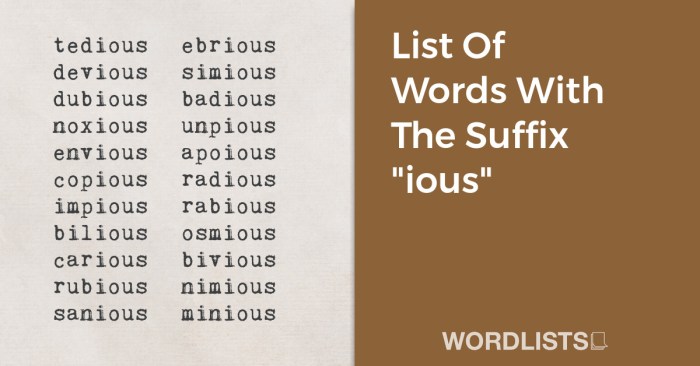Words with the suffix ious – Step into the captivating realm of words adorned with the enigmatic suffix “ious.” These linguistic gems, like precious stones, shimmer with shades of meaning, inviting us to explore their etymological origins, grammatical nuances, and literary artistry. Prepare to be enthralled as we delve into the depths of these extraordinary words.
Their roots firmly planted in Latin and French, words with the suffix “ious” have gracefully woven their way into the fabric of our language. They possess an inherent elegance, adding a touch of sophistication to both formal and informal discourse.
Morphological Analysis

The suffix “-ious” is an adjectival suffix that indicates a quality or characteristic. It is often used to form adjectives from nouns, but it can also be used with verbs and adjectives.
Words with the Suffix “-ious”
Here is a list of words with the suffix “-ious”, categorized by their part of speech:
Adjectives
- Ambitious
- Anxious
- Curious
- Delicious
- Furious
- Glorious
- Harmonious
- Injurious
- Jealous
- Mysterious
- Pious
- Precious
- Religious
- Spacious
- Suspicious
- Victorious
Adverbs
- Anxiously
- Curiously
- Deliciously
- Furiously
- Gloriously
- Harmoniously
- Injuriously
- Jealously
- Mysteriously
- Piously
- Preciously
- Religiously
- Spaciously
- Suspiciously
- Victoriously
Nouns
- Ambition
- Anxiety
- Curiosity
- Deliciousness
- Fury
- Glory
- Harmony
- Injury
- Jealousy
- Mystery
- Piety
- Preciousness
- Religion
- Spaciousness
- Suspicion
- Victory
Root Words
The suffix “-ious” is often added to nouns to form adjectives. In these cases, the root word is the noun itself. For example, the adjective “ambitious” is derived from the noun “ambition”.
The suffix “-ious” can also be added to verbs to form adjectives. In these cases, the root word is the verb stem. For example, the adjective “curious” is derived from the verb “to cure”.
Finally, the suffix “-ious” can also be added to adjectives to form adverbs. In these cases, the root word is the adjective itself. For example, the adverb “anxiously” is derived from the adjective “anxious”.
Etymological Exploration

The suffix “-ious” traces its roots back to the Latin suffix “-iosus”, which was often used to form adjectives from nouns. This suffix was adopted into Old French as “-ius” and eventually made its way into English during the Middle English period.
Over time, the meaning of the suffix has evolved from indicating a state or quality to conveying a sense of tendency or disposition.
Latin Origins, Words with the suffix ious
In Latin, the suffix “-iosus” was primarily used to create adjectives that described a person or thing as possessing a particular quality or characteristic. For instance, the adjective “odiosus” meant “hateful” or “detestable,” while “studiosus” meant “studious” or “diligent.”
Old French and Middle English
When the suffix “-iosus” entered Old French, it underwent a slight change in form, becoming “-ius.” This suffix was frequently employed to form adjectives that described a person’s character or disposition. For example, the adjective “envious” was derived from the Old French “envier,” meaning “to envy,” while “curious” came from the Old French “curios,” meaning “careful” or “inquisitive.”
Evolution in English
As the suffix “-ius” was adopted into English, its meaning underwent a subtle shift. While it initially retained its original sense of indicating a quality or characteristic, it gradually came to be used more specifically to convey a sense of tendency or disposition.
This evolution is evident in words like “ambitious,” which suggests a strong desire for success, and “nervous,” which implies a proneness to anxiety or fear.
Semantic Nuances

Words with the suffix “-ious” carry a range of meanings, from positive to negative, with subtle variations in connotation.
Subtle Variations
- Positive:Words like “ambitious” and “ingenious” convey a sense of determination and creativity, respectively.
- Negative:Terms like “anxious” and “obnoxious” evoke feelings of worry and unpleasantness.
- Neutral:Words such as “curious” and “spacious” simply describe a quality or characteristic.
The context in which these words are used further influences their interpretation. For instance, “anxious” can have a positive connotation in certain situations, such as when expressing excitement about an upcoming event.
Grammatical Applications

Words with the suffix “-ious” are typically adjectives, and they follow the grammatical rules that govern adjectives in the English language.
They function as modifiers of nouns, describing the qualities or characteristics of the thing or person being described. These adjectives agree with the nouns they modify in number and case, and they can be used in both attributive and predicative positions.
Agreement with Nouns
Words with the suffix “-ious” agree with the nouns they modify in number and case. For example, the adjective “spacious” can be used to describe a singular noun (e.g., “a spacious room”) or a plural noun (e.g., “spacious rooms”).
Agreement with Verbs
Words with the suffix “-ious” do not typically agree with verbs. They are adjectives, not verbs, and they do not change their form to agree with the tense or person of the verb.
Examples
- The spacious room was filled with light.
- The spacious rooms were filled with light.
- The room is spacious.
Literary and Stylistic Analysis

Words with the suffix “ious” offer literary and stylistic versatility, enabling authors to evoke specific tones, moods, and imagery.
The semantic nuances of these words allow authors to convey complex emotions and ideas with precision and elegance. The suffix “ious” often imparts a sense of abundance or excess, making words like “copious” and “voluminous” effective in describing lavish or overwhelming scenes.
Imagery
Authors can harness the evocative power of “ious” words to create vivid and immersive imagery. For instance, in Emily Dickinson’s poem “Because I could not stop for Death,” the line “We passed the School, where Children strove / At Recess – in the Ring –” uses the word “copious” to evoke a sense of abundance and joy, contrasting with the somber tone of the poem’s exploration of mortality.
Tone
The suffix “ious” can shape the tone of a literary work. Words like “gracious” and “ingratiating” convey a sense of politeness and charm, while “odious” and “nefarious” create feelings of disgust and wickedness. In Jane Austen’s novel “Pride and Prejudice,” the use of “ingratiating” to describe Mr.
Collins highlights his obsequious and manipulative nature, contributing to the novel’s satirical tone.
Let’s talk about words with the suffix “-ious.” These words often describe something as full of or characterized by a particular quality. For example, “studious” means “full of study” and “spacious” means “full of space.” Have you ever heard of a “kappa sweetheart”? ( what is a kappa sweetheart ) It’s a term used to describe a woman who is involved with a member of the Kappa Alpha Psi fraternity.
So, if you’re looking for words that describe something as full of or characterized by a particular quality, be sure to check out words with the suffix “-ious.”
Mood
Words with the suffix “ious” can also influence the mood of a literary work. For example, “auspicious” and “propitious” evoke a sense of hope and optimism, while “ominous” and “insidious” create feelings of foreboding and danger. In Shakespeare’s play “Macbeth,” the use of “ominous” to describe the witches’ prophecies foreshadows the tragic events to come, setting a dark and foreboding mood.
Cross-Cultural Comparisons

The suffix “-ious” traverses cultural boundaries, enriching languages with its versatility. Its usage and interpretation, however, are influenced by the unique tapestry of each culture.
In English, words like “ambitious” and “curious” evoke a sense of drive and inquisitiveness. In Spanish, “ansioso” conveys a more intense anxiety, while in French, “curieux” encompasses both curiosity and eccentricity.
Similarities
- Across cultures, words with the suffix “-ious” often express qualities or characteristics.
- They may denote positive or negative traits, depending on the root word.
- These words can be used to describe individuals, situations, or actions.
Differences
- The intensity or nuance of meaning can vary significantly.
- Cultural context shapes the interpretation of these words, influencing their connotations and usage.
- In some languages, the suffix “-ious” may have a more formal or literary tone.
FAQ Insights: Words With The Suffix Ious
What is the origin of the suffix “ious”?
The suffix “ious” has its roots in Latin and French, where it was used to form adjectives from nouns.
How do I use words with the suffix “ious” correctly?
Words with the suffix “ious” typically function as adjectives and should agree with the nouns they modify in number and gender.
What is the difference between “anxious” and “eager”?
While both “anxious” and “eager” convey a sense of anticipation, “anxious” often carries a negative connotation of worry or apprehension, while “eager” has a more positive connotation of enthusiasm.